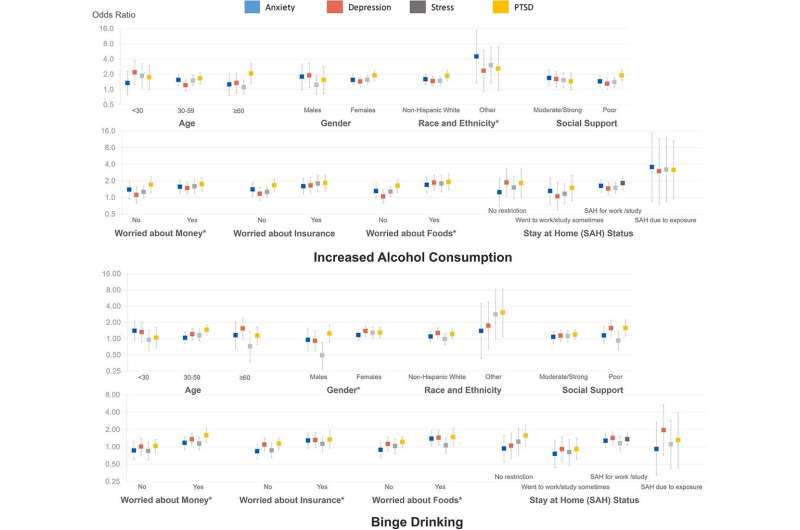This article has been reviewed according to Science X's editorial process and policies. Editors have highlighted the following attributes while ensuring the content's credibility:
fact-checked
peer-reviewed publication
trusted source
proofread
Study reveals insights on pandemic-related drinking and mental health

New research from the University at Buffalo provides the most comprehensive assessment to date of drinking patterns during the COVID-19 pandemic and their association with four clinically prevalent mental health disorders in the U.S.
The study, published in March in the journal Alcohol and Alcoholism, looked at alcohol consumption among more than 3,600 U.S. residents, and examined associations between drinking patterns and anxiety, depression, stress and post-traumatic stress disorder (PTSD).
"We found that people who kept their drinking patterns had lower prevalence of mental health issues than abstainers or those whose drinking pattern changed," said study first author Yihua Yue, an epidemiology and environmental health Ph.D. student in UB's School of Public Health and Health Professions.
"However, increased alcohol use and binge drinking were associated with higher odds of mental health disorders, highlighting the co-existence of alcohol overconsumption and mental health problems as a public health concern of the negative COVID-19 impacts."
The research team included undergraduate students, and high school students from Nichols school and Williamsville East High School, who were actively involved in all aspects of the study, including assisting with a poster presentation at the Public Health Partnership Conference, where the study's findings were highlighted.
Study participants provided information on four measures of alcohol consumption during the pandemic: drinking frequency, number of drinks per occasion, change in alcohol consumption since the COVID-19 pandemic, and binge drinking frequency. Self-reported symptoms of four mental health disorders were also obtained. The prevalence of symptoms of anxiety (23%), depression (27%), stress (51%) and PTSD (22%) was identified from May through August 2020, when a stay-at-home policy was in effect for several months.
During the pandemic, a significant portion of study participants altered their drinking habits, with 23% of respondents increasing alcohol consumption and 8% decreasing; 4% reported binge drinking weekly or more.
The study also broke out social determinants to, for the first time, identify groups that have stronger associations of alcohol consumption with mental health outcomes.
"We found that women, members of underrepresented groups and people who were worried about money who either increased their alcohol use or engaged in binge drinking during the pandemic experienced worse mental health," Yue said.
People who did not have any financial concerns tended to drink more often.
Interestingly, drinkers had lower odds of all mental health symptoms, and the odds decreased with increased frequency. Individuals who drank weekly or more often, and those who had 10 drinks or more per month, had significantly lower odds of depression, the study found. But, participants who reported binge drinking had higher odds of reporting depression and stress.
Study senior author Lina Mu, MD, associate professor of epidemiology and environmental health in the School of Public Health and Health Professions, cautions, however, "It is important to interpret the data carefully and we must note that this study does not draw causal inferences."
Yue says it's possible that other factors that were not measured in the study may co-exist with alcohol use and mental health symptoms. For example, socially active individuals may regularly consume moderate amounts of alcohol and display greater resilience when facing mental health challenges. It is, then, their mental resilience—not their alcohol use—that protects them from mental health problems.
Moreover, she adds, people with financial stability may be more inclined to engage in moderate alcohol consumption as a social activity and may have better access to resources that help them manage stress and address mental health. On the other hand, individuals experiencing financial difficulties might be more susceptible to excessive alcohol consumption as a coping mechanism for stress or mental health problems, potentially worsening their mental health conditions.
"During the pandemic, people went through so many behavioral changes," says Mu. "It is very critical to understand how those changes influence mental health so that we can guide the public to be better prepared in preventing mental health problems. This is a very complicated issue, and we are still at the early stage of addressing it."
More information: Yihua Yue et al, Alcohol Consumption and Mental Health during the COVID-19 Pandemic, Alcohol and Alcoholism (2023). DOI: 10.1093/alcalc/agad011


















